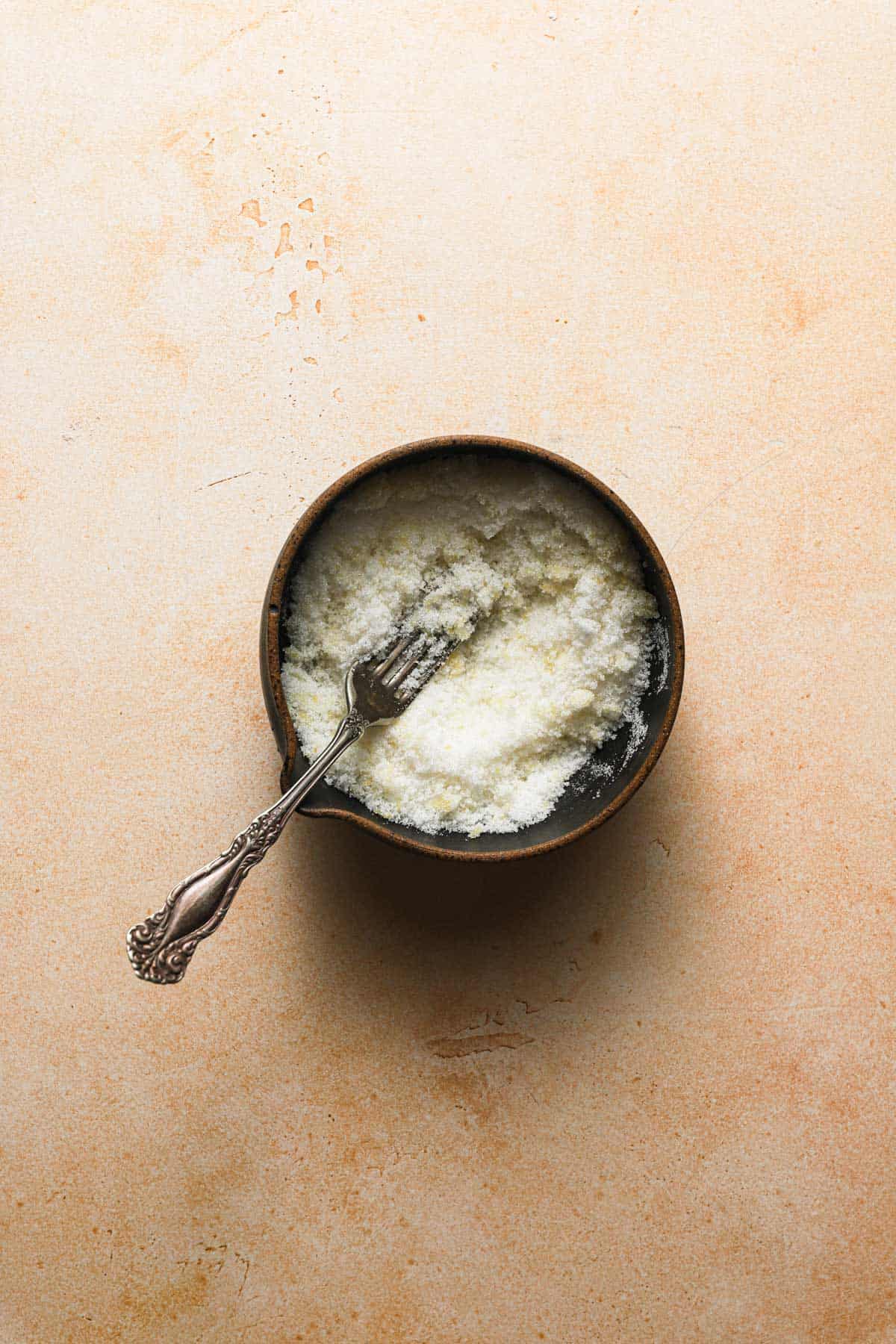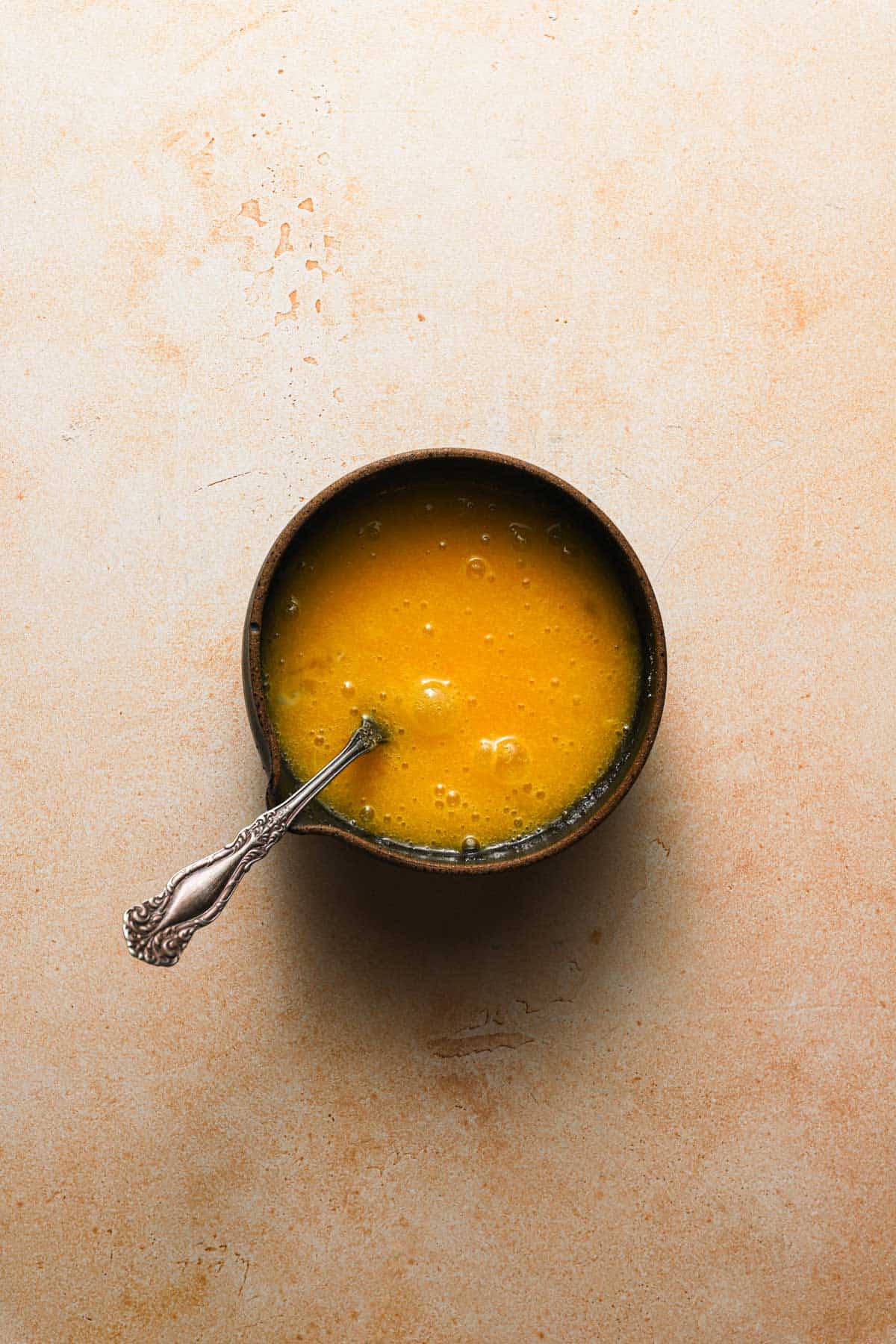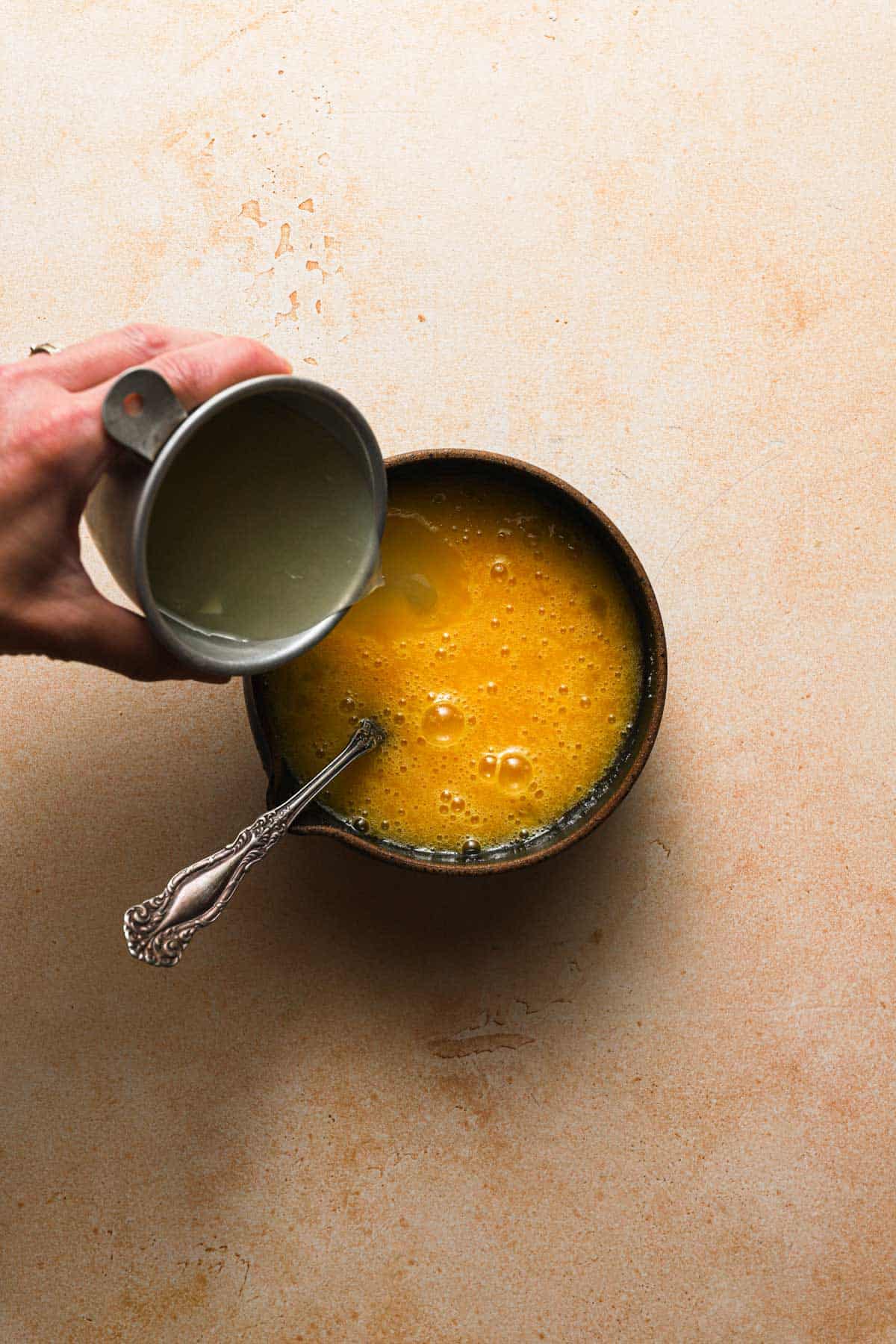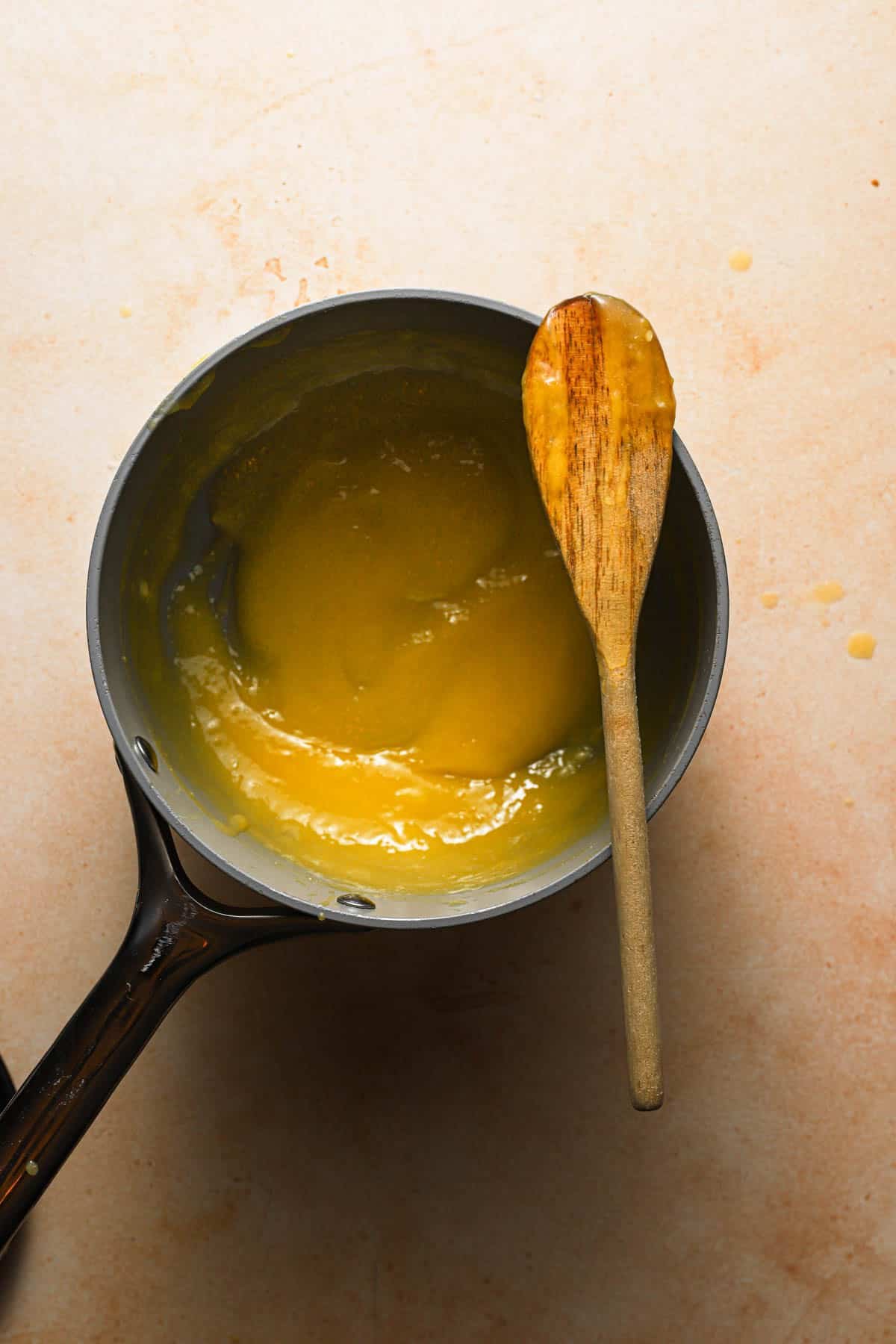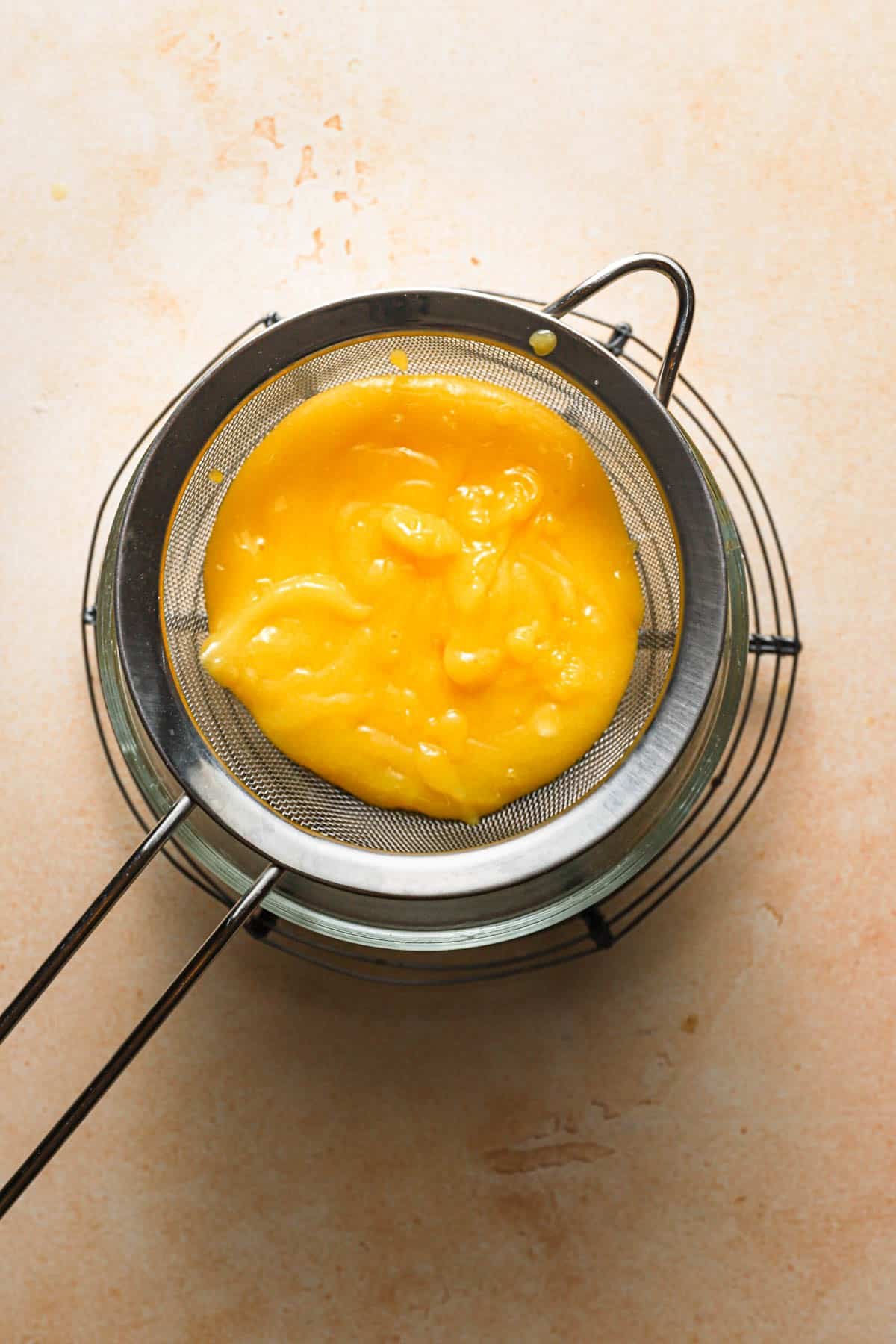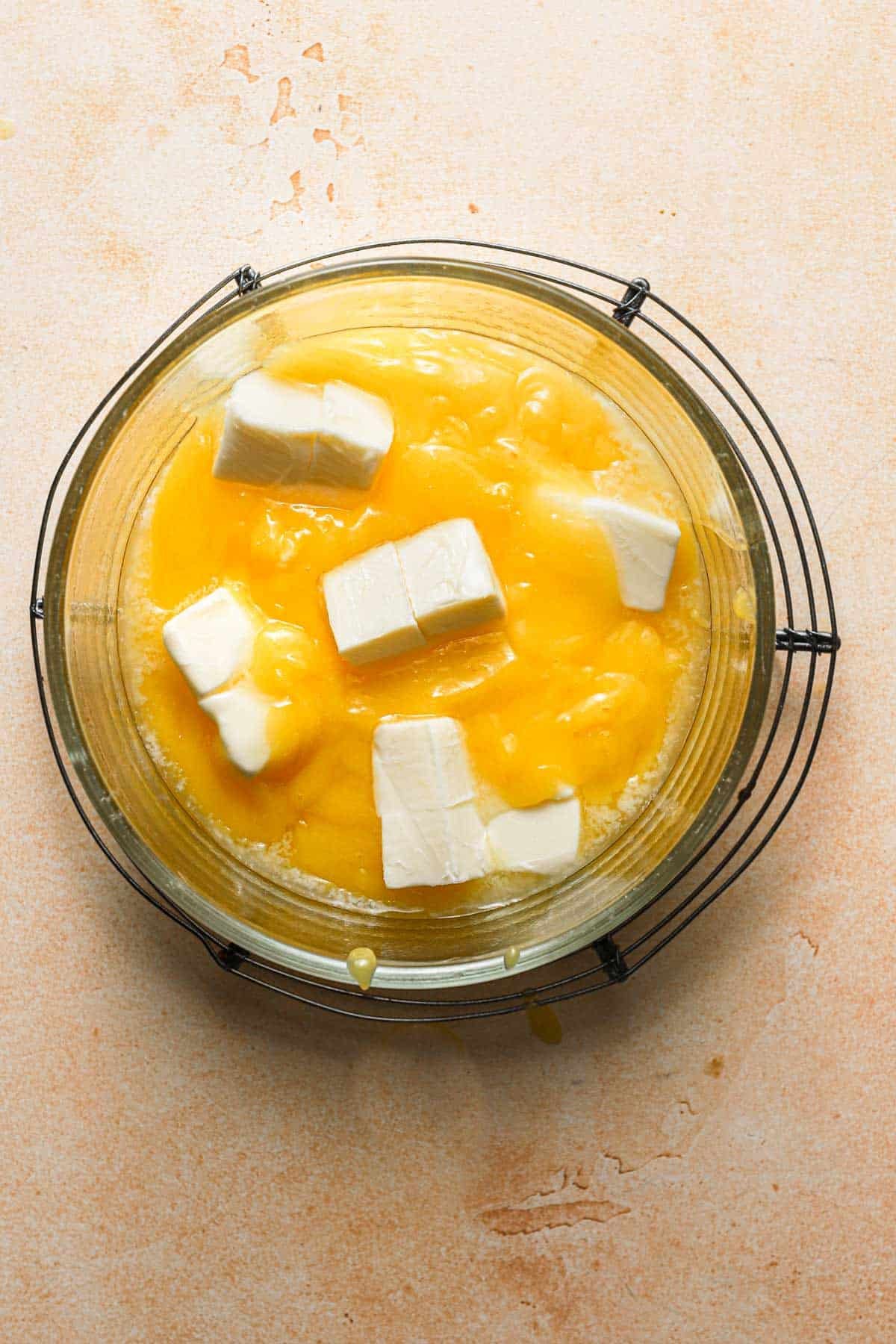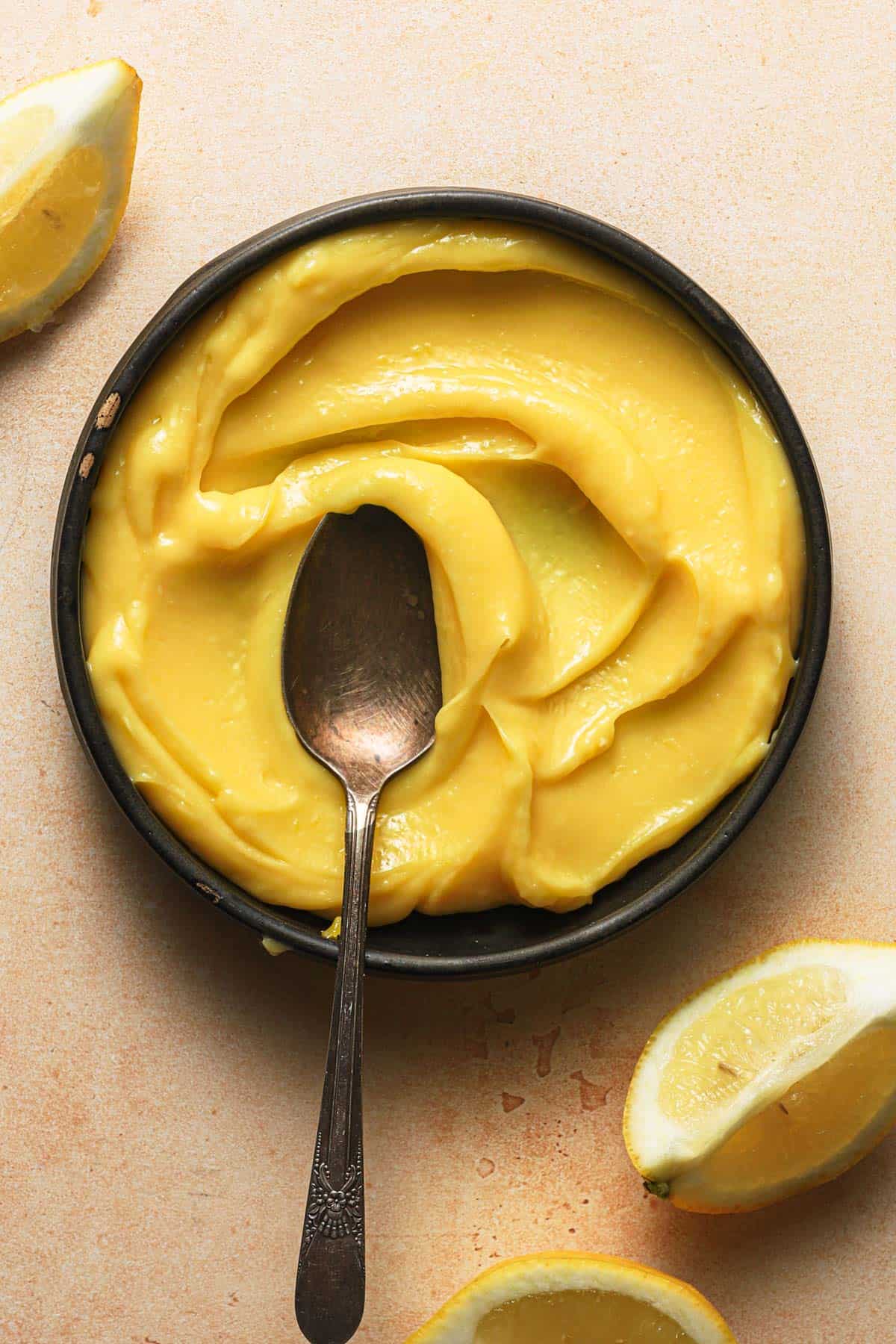Last updated on April 30th, 2024.
Lemon curd is a delightful spread bursting with tangy citrus flavor, perfect for adding a zesty touch to your desserts or breakfast treats. If you’ve ever wondered how to whip up this delicious concoction from scratch, you’re in luck! In this guide, we’ll walk you through the process step by step, from understanding what it is to storing it for future use.
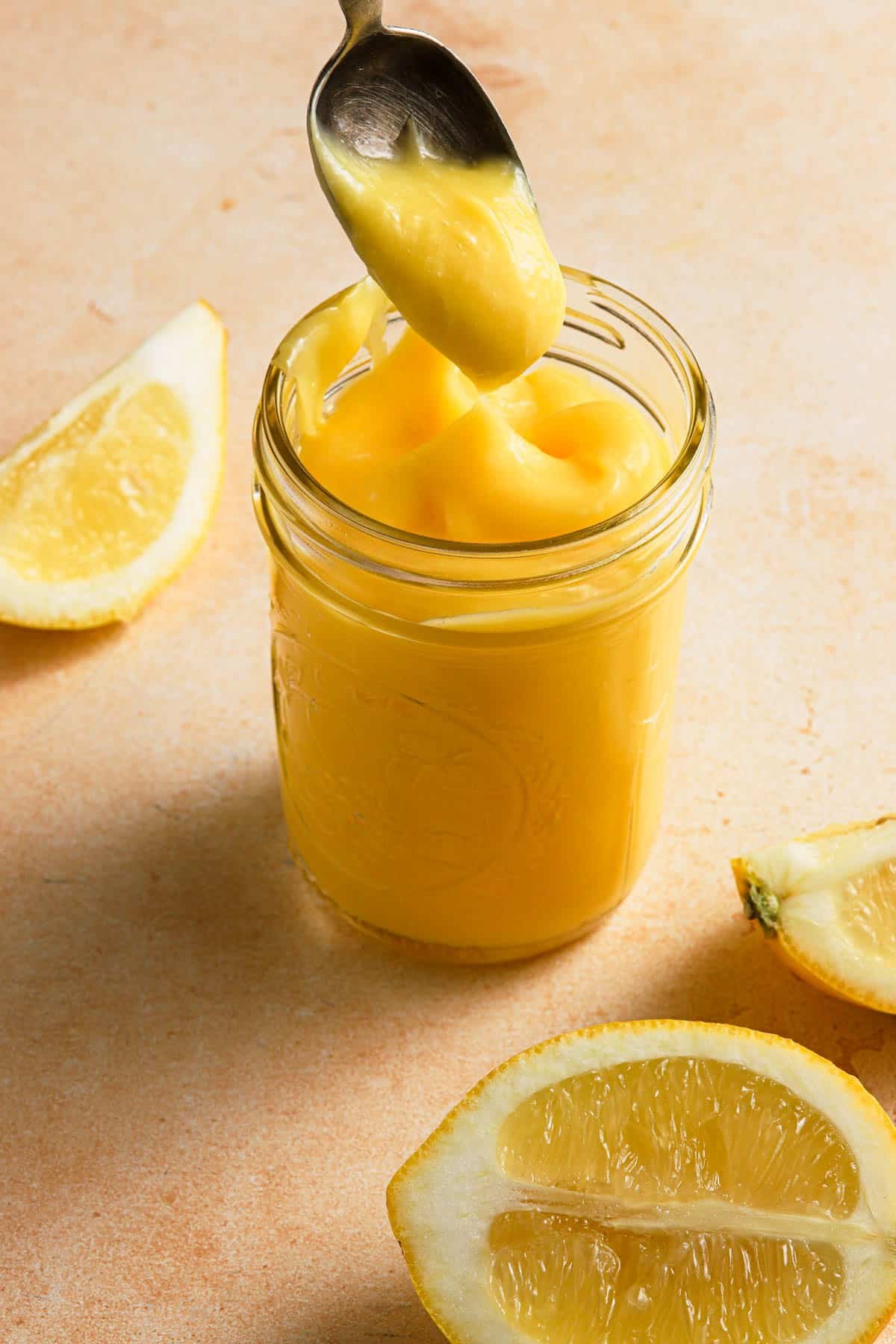
What is Lemon Curd?
It is a smooth, creamy custard made from fresh lemon juice, zest, sugar, eggs, and butter. It boasts a vibrant yellow color and a rich, tangy flavor that pairs beautifully with various baked goods and desserts. From filling tarts and cakes to topping scones and pancakes, this lemony curd adds a burst of citrusy goodness and bright flavor to any dish.
If you are a fan of lemon recipes, check out this Torta Paradiso, this Lemon Sponge Cheesecake, this Lemon Blackberry cake, and this Lemon Blackberry Bread.
For more fruit curd recipes, check out this Orange curd recipe, this Lime Curd, this Raspberry Curd, this Blackberry Curd, and this Meyer Lemon Curd.
Ingredients
This recipe calls for simple ingredients, but the key to making it the best lemon curd is high-quality butter, fresh eggs, and lemon juice.
- Egg yolks (from large eggs)
- Large egg
- Granulated sugar
- Lemon juice. This recipe will work for regular lemons or Meyer lemons.
- Fresh lemon zest
- Unsalted butter, cubed
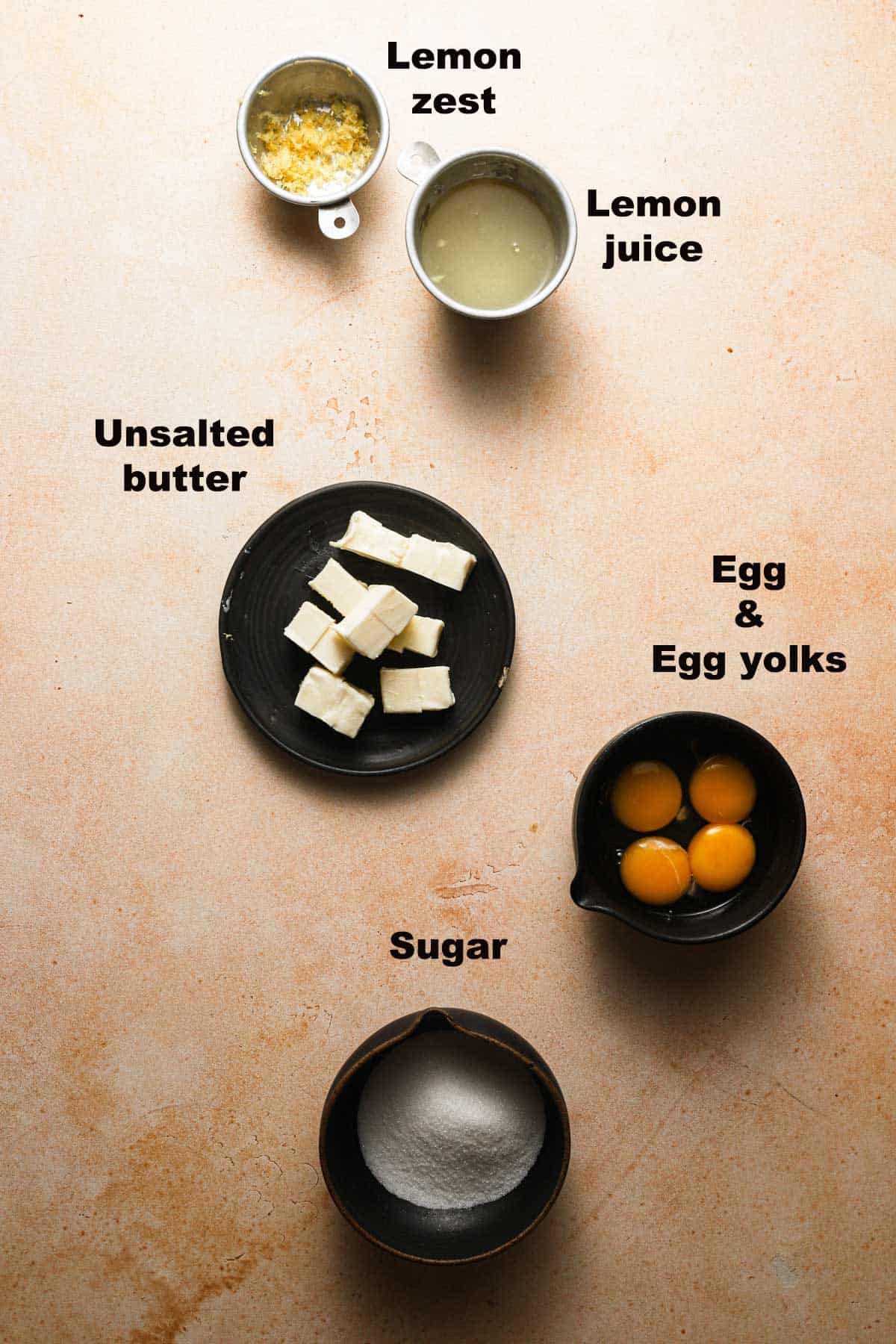
How to Make Lemon Curd
Time needed: 15 minutes
The full recipe, including measurements, can be found in the recipe card below.
- Rub the zest into the sugar.
This step will release the zingy flavor of the lemons.
- Whisk the eggs and sugar:
Whisk together the egg yolks, eggs, and sugar in a heatproof bowl until well combined.
- Combine the ingredients:
Add the lemon juice to the egg-sugar mixture and whisk until smooth.
- Cook over low heat:
Place the pan over the stove until the mixture thickens. It will transform from a light and thin mixture into a slightly thick and opaque.
- Strain the curd:
Once thickened, remove the bowl from the heat and strain the curd through a fine mesh strainer to remove any lumps or zest.
- Mix in the butter:
Add the cubed butter to the curd and gently mix it until melted.
- Allow the curd to cool.
Store it in the refrigerator for up to two weeks before transferring it to a sterilized mason jar or airtight container.
Tips
- Use room temperature eggs and butter for best results.
- To check if the curd is ready, run your finger at the back of a spoon dipped. It is done if it leaves a thick coat and creamy consistency.
- Be sure to thoroughly whisk the eggs and sugar to ensure a smooth texture in the final curd.
- Avoid letting the curd boil over low heat, which can cause the eggs to curdle. Use a double boiler to avoid direct heat, and take an extra step to ensure the recipe’s success.
- You can increase the amount of butter used in the recipe for a thicker curd.
How to Use Lemon Curd
Lemon curd is incredibly versatile and can be used in a variety of ways
- Make this tangy Limoncello Tiramisu.
- Serve it over a piece of pound cake or angel food cake. Try this Butter Cake and this Ciambellone cake.
- Serve it with a piece of Limoncello Cake.
- Use it as a filling for cake layers.
- Use it as a filling for cakes, tarts, or cupcakes. Try these Lemon curd cookies.
- Drizzle it over pancakes, mini pancakes, waffles, or ice cream.
- Mix it into whipped cream for a lemony twist.
Storing
Store the curd in the refrigerator for up to five days. To freeze, place it in a freezer bag, remove as much air as possible, and freeze for up to twenty weeks. When ready to use, refrigerate overnight.
FAQ
Yes, you can use three whole eggs instead of the egg yolks. But remember that the egg yolks provide a creamy texture.
Not fresh eggs, or when very cold, can contribute to an “eggy” flavor.
The eggs and yolks coagulate as they are heated, trapping the liquids in between the gaps. That’s why it is essential to cook the mixture long enough.
Mix one tablespoon of cornstarch with the zesty sugar before mixing in the eggs.
When hot and fresh, lemon curd might seem runny; allow it to cool and set. If your curd is too watery, it may not have been cooked long enough. Make sure to cook it until it thickens to a custard-like consistency. Additionally, be sure to strain the curd to remove any excess liquid.
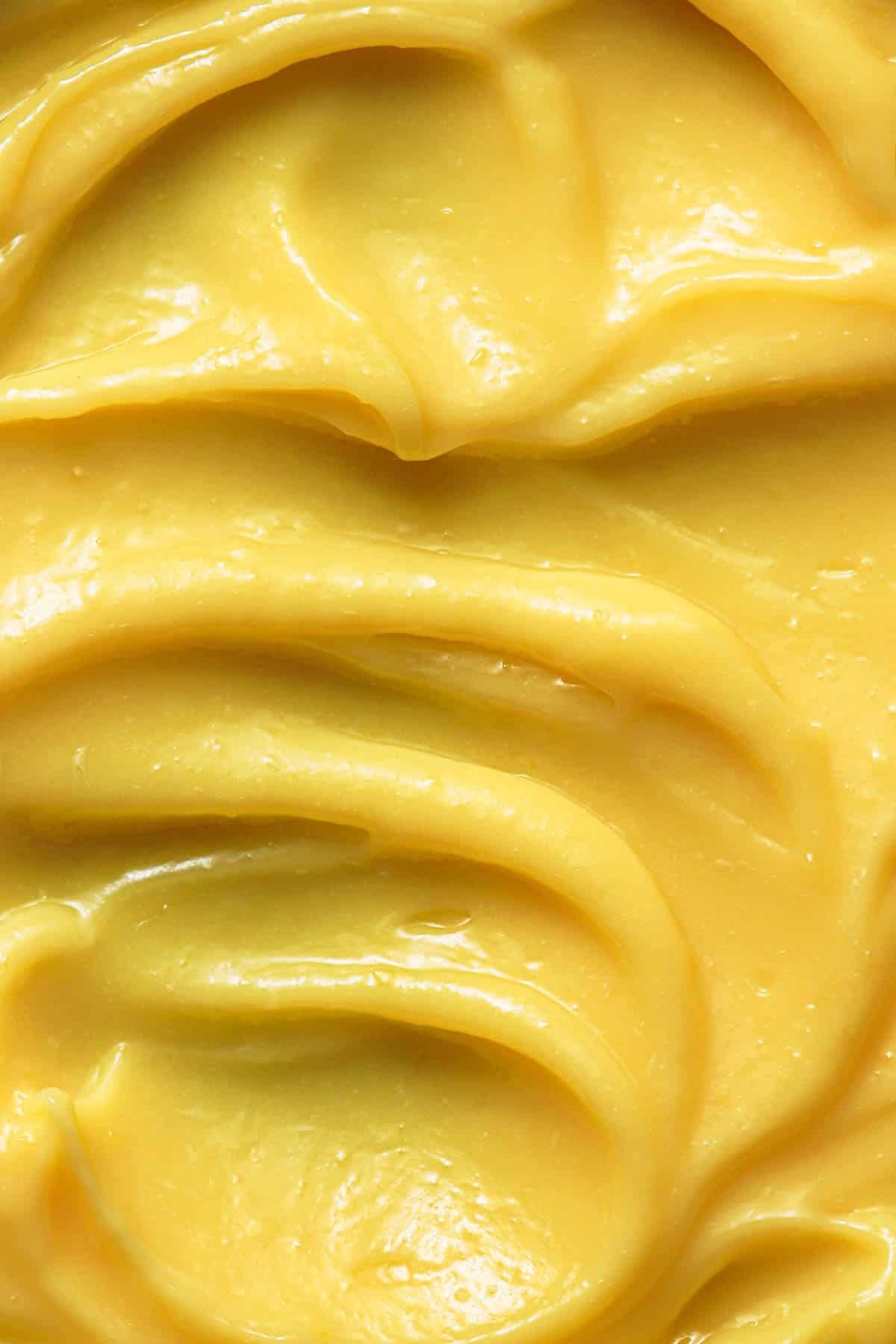
More Custard Recipes You Might Enjoy
Pastry Cream, Creme Legere, Italian Pastry Cream.
Please rate and comment if you enjoyed this recipe, and don’t forget to tag me on Instagram when you bake one of my recipes.

Lemon Curd Recipe
Tangy and sweet lemon custard.
Ingredients
- 1/2 Cup Sugar (100g)
- 1 Tablespoon Fresh lemon zest (from about 2 medium lemons)
- 1 Large Egg at room temperature
- 2 Large Egg yolks at room temperature
- 1/2 Cup Fresh squeezed lemon juice (120ml)
- 6 Tablespoons Unsalted butter cut into 1/4-inch pieces (85g)
Instructions
-
Tun the lemon zest into the sugar.
-
Mix the egg and egg yolks into the sugar.
-
Mix in the lemon juice.
-
Pour the mixture into a medium saucepan and cook over low heat, while constantly stirring until the mixture has thickened and coats the wooden spoon you are using.
-
Run the curd through a sieve over a bowl.
-
Add the butter and gently stir until the butter is completely melted.
-
Allow the curd to cool, then use or refrigerate for up to five days.
Recipe Notes
- Store in the refrigerator for up to five days. To freeze, place in an airtight container or a freeze bag for up to eight weeks. When ready to use, place in the refrigerator the night before.
- To establish the curd’s readiness, swipe the back of a spoon dipped into it with your finger. It’s done when it coats the spoon thickly and exhibits a creamy consistency.
- Prevent the curd from boiling over low heat, which may cause the eggs to curdle. Use a double boiler to avoid direct heat and take an additional precaution to ensure the recipe’s success.
- If desired, increase the quantity of butter in the recipe to achieve a thicker curd.

